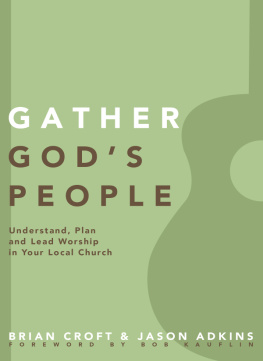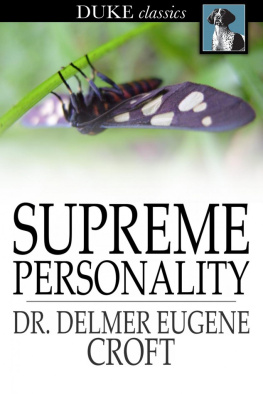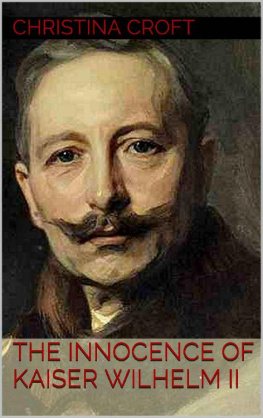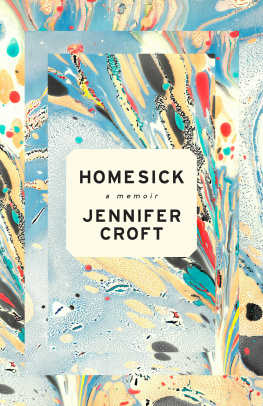THE PURPLE STREAK
by
Rupert Croft-Cooke

To
Julia and Joan
This electronic edition published in July 2011 by Bloomsbury Reader
Bloomsbury Reader is a division of Bloomsbury Publishing Plc, 50 Bedford Square, London WC1B 3DP
Copyright Rupert Croft-Cooke, 1966
The moral right of the author has been asserted
All rights reserved
You may not copy, distribute, transmit, reproduce or otherwise
make available this publication (or any part of it) in any form, or by any means
(including without limitation electronic, digital, optical, mechanical, photocopying,
printing, recording or otherwise), without the prior written permission of the
publisher. Any person who does any unauthorised act in relation to this publication
may be liable to criminal prosecution and civil claims for damages
ISBN: 9781448204977
eISBN: 9781448204533
Visit www.bloomsburyreader.com to find out more about our authors and their books
You will find extracts, author interviews, author events and you can sign up for
newsletters to be the first to hear about our latest releases and special offers
Contents
This is the seventh book in this sequence and here I should like to give some small explanation of what I am trying to do.
The past, from earliest childhood, is a continuous panorama to me because I have one of those freakish memories in which facts may be confused but persons, atmosphere, sights, sounds and even smells remain real and vivid. It seemed to me that I should record this past, giving to the reader an acquaintance with the places and people, the events and outward experiences of my life uncomplicated by too many details of my own reactions to them, my own inward development, all that introspection and self-pity which can stream over the pages of an autobiography in a slushy tide. I wanted, in other words, to recall, describe and reproduce objectively.
This was an impossible ideal, as objectivity always is, but I have kept it in front of me and so avoided the most febrile kinds of egomania.
It happens that my life has been, and continues to be, well suited to this treatment, for it has been followed with immense gusto through highly varied settings, a thing of extremes which has yet touched common experience at many points. In it most people of my generation will recognize something of their own past but may be pulled up by small surprises. It has stretched through significant years and is mile-stoned by public events, but I am concerned with social rather than political history, if with history at all. What I seek to answer is the simple questionwhat was it like to be alive at such a time, doing so and so, seeing, hearing, experiencing this, that or the other? These books, in other words, are only autobiographical because I use my own past experience as a thread; they are not about me, but about what I have seen and heard and known.
I am therefore concerned with detail rather than tendency, and am open to the charge of triviality. But most of life is trivial and to give it shape and passion, it seems to me, is the novelists business not the autobiographers. I have in fact avoided the deeper issues of love, religion and philosophy except to make the most objective statements about them. One critic has said that in doing so I have revealed myself as much as I should have done by a more introversive treatment; if this is so it is not by my intention.
When I started to write the first of these books I supposed it would take me well into my teens but found that I reached only my eleventh year and the outbreak of the First World War. I have not since tried to foresee what periods any of them would cover and these have varied considerably. The present book happens to take in the shortest period of allbarely two years.
I have made each independent of the rest, re-introducing people and places with brief explanations where necessary. This is to avoid a nudging confidential tone with the reader, or expecting him to know all about things described in previous books in the sequence. It seems to me that with such shifting scenes I must maintain this independence of each book from its fellows, since someone interested, for instance, in life in Republican Spain which occupies nearly half the present book might be bored by my experiences as an antiquarian bookseller which occupied nearly half the last one. But I gather that I have the great good fortune of a few readers who follow these books through consistently.
I have been asked whether I elaborate, or whether details of scene and dialogue are precisely remembered. In description I conscientiously avoid anything I cannot actually see in recollection. Of conversations I can only say that I reproduce them as I remember them, adding nothing consciously, but perhaps giving them more shape and succinctness than would have come from a tape-recorder. I have no diaries, notes or documents to go on, such personal papers as I had being destroyed in a warehouse fire in 1953. I do not regret this. Ones memory is best left to its own discriminations and not distorted by the arbitrary guidance of something written down at the time.
This book is the latest in a sequence which has proceeded from childhood. In it I reach my thirty-first year. But there are, the reader may observe, a number of books already published which cover certain periods or episodes of later in my life. These, dismembered or whole, will be drawn into the narrative as it reaches them. The whole sequence, if it is completed, will run to about thirty volumes, or two and a half million words, enough perhaps to devote to a single thread of experience. But not, in my view, too much.
Tangier,
May 27, 1965.
Chapter One
Journey South
[1]
In The Spring of 1932 I was selling up the contents of my flat in a dingy London street called Upper Westbourne Terrace. I had lived there only eight months but I did not regard as failure the end of this first attempt to make a home in London and support it by writing. On the contrary I was fulfilling another ambitious schemeto go abroad and work on a new novel. I was twenty-eight years old.
Two years earlier my first novel to be published had come from Chapman and Hall, but it was the fifth I had written which shows the sort of obstinacy that had sustained me through years of teaching, freelance journalism and bookselling. It had been followed by two more and the last of these, Night Out, had gone into a second edition. Now I had 30 paid in advance on the as yet unwritten fourth, and with that sum, and another small advance and whatever I could raise on my possessions, I should have enough to live in Spain while I wrote the transcendent book which would, I believed, put me beyond all petty cares and economies.
This lack of realism came perhaps from the fact that I had not been up at Oxford or worked in Fleet Street, either of which might have given me a sense of proportion. I had been encouraged by Kipling and Galsworthy both of whom had invited me to their homes and given me grave and valuable advice. I had known my fellow contributors to the New Coterie, H. E. Bates, Paul Selver, Rhys Davies, John Brophy, Liam OFlaherty amongst them, but I had not achieved membership of any clique and had never felt the heartening effect of belonging to a school of young artists who work in friendship and competition. Of a bourgeois and thoroughly philistine family, I had written throughout my boyhood in the lonely belief, unsupported by anything but my own vanity and self-confidence, that I was destined to be a writer. In a megalomaniac dream I had read criticism of my first books, and attributed percipience to those who praised and prejudice or blindness to those who censured my immaturity. I was a riproaring young egotist, straining towards sophistication, but unable to achieve more than a deliberate banking of what I believed was experience.









